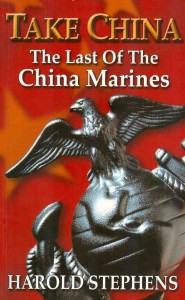 Harold Stephens, author of Take China: The Last of the China Marines (2003, ISBN 0-9642521-8-X), maintains that the book is a novel, but in actuality it’s a memoir, his autobiographical tales of serving with the U.S. Marines, transitioning from the end of World War II to mainland China. He’s changed the names, but it’s all true, and most of the fascinating tales occur inside China, particularly in the cities of Tsingtao and Shanghai, before Mao’s Red army took over.
Harold Stephens, author of Take China: The Last of the China Marines (2003, ISBN 0-9642521-8-X), maintains that the book is a novel, but in actuality it’s a memoir, his autobiographical tales of serving with the U.S. Marines, transitioning from the end of World War II to mainland China. He’s changed the names, but it’s all true, and most of the fascinating tales occur inside China, particularly in the cities of Tsingtao and Shanghai, before Mao’s Red army took over.
Stephens begins with his stint in Okinawa, a bloody, rotting hell that he was happy to leave. When the bombs dropped on Japan, he thought he’d be going home. Not so, he was being shipped to China, to assist Chiang Kai-shek. The author’s stories about ship life provide an interesting sidelight:
Our secluded area provided another service that made life a bit easier. Washing clothes aboard a troop ship was a problem. No washing machines. No laundry service. Marines crammed into the heads, under the showers, and attempted to scrub away the dirt and smell from their dungarees with salt water. Others had found an easier way, by lying their clothes to long lines and dragging them aft of the ship. The pounding sea usually washed them clean, but before long everyone was crowding the aft deck vying for space to tie their lines. Often times it became a real mess when lines tangled and fights would ensue.
Under our lifeboat we didn’t have that problem. We dangled lines over the side, with our clothes securely fastened to one end. At the water’s edge below us, the ship cast a wake that kept our laundry a yard or two away from the side of the ship. It worked as long as they didn’t pump the bilge.
Where the book really shines, though is in its description of China and her people. He painstakingly learned Mandarin, and got to love the country and her people. He chronicles the quotidian life of a Marine life as well, discussing the personalities and actions of officers and enlisted men. Many a bar and bordello is visited in this book, and there are bar fights galore. To us here at WoWasis, the most fascinating part of the book describes his interactions with the White Russians who ended up in China, living a temporary existence, and waiting to go to the U.S., or perhaps back to a more forgiving Russia. Many of them came by way of Siberia, through Harbin, then to Shanghai or Tsingtao. They weren’t all poor either, as was the case with the beautiful Katarina and her two aunts, whose apartment was like a museum. Katarina’s story is perhaps the most memorable of the book. Here’s one scene:
I am a white woman, a White Russian, you remember?”
I didn’t have time to answer. She came to me and threw her arms around my neck. “I can’t bear it any longer” she sighed. “I want you. I need you.” I could feel my pulse quicken. She reached down and took the towel from around my waist and threw it over the back of the chair. She took off her coat and placed it too on the chair. Without taking her eyes from me, staring straight at me, she took off her boots and stockings, removed her dress and inner garments, and stood there in front of me completely naked. 1 could only look upon her Vargas-girl body in disbelief. Her skin was flawless, and absolutely white. Her breasts were firm; her waist thin. She stood there, letting my eyes and thoughts feast upon her. She held her garments in her hand, and then slowly turned to place them on the chair.
She saw something that made her gasp. She jumped back as if she was confronted by a demon with fangs about to pounce at her. She clasped her hands over her mouth. The door to my closet was open.
“What is it?” I called and leaped toward her.
“Your uniform!” she cried.
“My uniform,” I replied, “what about it?” I saw my uniform that Yee had hung carefully on a hanger, along with my shin. The chevrons were exactly as I told him to sew them on.
“What’s wrong with that?”
“The stripes! You are only a corporal,” she stammered.
“What’s wrong with that?” I said, completely confused.
“I thought you were a captain.”
What becomes of Katarina is a strong plot line that drives much of the second half of the book. The fate of many of the White Russians was sobering. Stephens also reveals other interesting data that many of us didn’t know, beginning with the fact that U.S. Marines were there, at that time, in the first place. Another grim data point is that the Japanese murdered their comfort women en masse in the caves of Okinawa.
Stephens is a master storyteller, and this one is highly recommended. Buy it now at the WoWasis eStore.
Leave a Reply